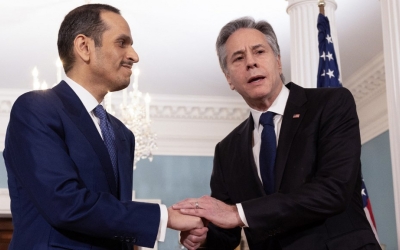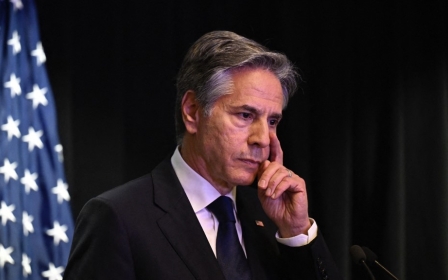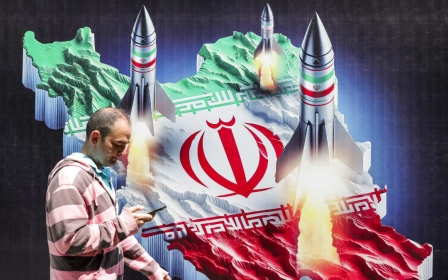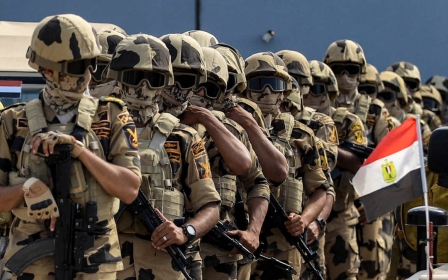Israel planning ring of checkpoints to prevent men from fleeing Rafah, source says

Israel is reportedly setting up a complex system of checkpoints that will prevent men of "military age" from fleeing Rafah in preparation for its offensive on the southern Gaza border city, a senior western official familiar with Israel's military plans has told Middle East Eye on condition of anonymity.
The checkpoints are designed to allow some women and children to leave Rafah ahead of an expected Israeli offensive, but unarmed, civilian Palestinian men will likely be separated from their families and remain trapped in Rafah during the assault.
The previously unreported disclosure of Israel's construction of a ring of checkpoints around Rafah underscores how Israel is pushing ahead with plans to attack the city where over one million displaced Palestinians are sheltering in tents and makeshift camps.
"They [the Israelis] have set up or are setting up sophisticated checkpoints....They allow women and children to move, but fighting aged males are another thing," the senior official said.
The creation of gender-based checkpoints around Rafah would put a spotlight back on Israel's practice of stripping and forcibly detaining male Palestinian men and children, as it faces rising scrutiny in the West of its conduct in the war.
New MEE newsletter: Jerusalem Dispatch
Sign up to get the latest insights and analysis on Israel-Palestine, alongside Turkey Unpacked and other MEE newsletters
The rounding up of Palestinian males in Gaza and photographing them stripped to their underwear drew condemnation in December, with the US calling the images "deeply disturbing."
Relatives of many of the men photographed recognised them and said they had nothing to do with Hamas. Israel's military was later accused of staging footage of men surrendering weapons.
"Israel considers every male a Hamas fighter until proven otherwise," Abbas Dahouk, a former senior military advisor at the State Department and military attache in the Middle East told Middle East Eye.
"It's not a sound move. Cordoning Rafah is a daunting task and good luck separating fathers and sons from their families."
Truce talks down to the wire
Israel's preparations for an assault are occurring at the same time it continues down-to-the-wire truce talks with Hamas. A delegation from Hamas is set to visit Egypt on Monday for further negotiations.
The US, UN, European states and Arab powers are pushing to avert a Rafah offensive, which aid workers and diplomats say could spark a humanitarian disaster and potential refugee crisis.
US Secretary of State Antony Blinken on Monday urged Hamas to accept the latest Israeli truce offer which he described as "extraordinarily, extraordinarily generous."
"In this moment, the only thing standing between the people of Gaza and a ceasefire is Hamas," Blinken said in Riyadh at the World Economic Forum.
"They have to decide - and they have to decide quickly," Blinken said, in an apparent reference to Israel’s threat to invade Rafah.
In Riyadh, Blinken met with Turkish Foreign Minister Hakan Fidan and Qatari Prime Minister and Minister of Foreign Affairs Mohammed bin Abdulrahman al-Thani.
Both Qatar and Turkey maintain ties with Hamas, with the former hosting the group’s political leadership at the request of Washington. Egypt, which borders Rafah and whose security establishment talks directly with Hamas’s armed wing, the al-Qassam Brigades, is also mediating.
MEE reached out to the White House and the Israeli embassy in Washington for comment on this story, but neither responded by the time of publication.
Reconnaissance by fire
Israel has offered a 40-day truce to Hamas and the return of thousands of Palestinians held in Israeli jails in exchange for hostages. It has also downsized its demand that at least 40 hostages held in Gaza be released, with the new figure being placed at 33 hostages.
But Hamas has called for a permanent ceasefire, the withdrawal of Israeli troops from Gaza and the return of forcibly displaced Palestinians to their homes. A key sticking point in the talks has been Hamas’s demand that Palestinian families are not to be separated going back to their homes.
As truce talks drag on, Israel has ramped up its threat to invade Rafah, where it says four Hamas battalions are stationed. As the threat of an Israeli attack mounts, Hamas has also released more hostage videos.
Israel's potential assault on Rafah is in many ways unique to warfare.
The border town turned sprawling refugee camp is hemmed in on the left by the Mediterranean Sea and on the right by Israel proper, both of which Israel controls. Egyptian troops are massed along Rafah’s southern border where Cairo has vowed to prevent an influx of refugees. Hamas fighters have shed their uniforms and disappeared into a vast tunnel network, military experts say.
Israeli analysts have told MEE previously that Israel's war cabinet believes it can't declare victory in Gaza without attacking Rafah, but other analysts say the bloody assault is unlikely to extract Israel from the Gaza quagmire.
"The conduct of Israel’s operations from north to south has been revenge-driven, not intelligence-driven," Dahouk told MEE. "They don’t know where the enemy is. It's reconnaissance by fire."
This article is available in French on Middle East Eye French edition.
Middle East Eye delivers independent and unrivalled coverage and analysis of the Middle East, North Africa and beyond. To learn more about republishing this content and the associated fees, please fill out this form. More about MEE can be found here.





